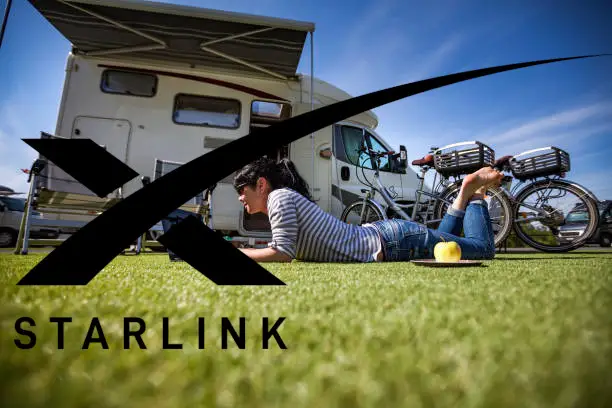Everyone loves camping. Going into nature for a few days is exhilarating and stimulating. I love RV living. I don’t miss anything while I’m camping. However, during my several cross country road trips, I missed one particular thing — a good internet connection.
I know many people live in an RV full time. There are also travel vloggers and campers. All of them have one common problem — not having a dependable internet connection with reasonable price and speed. Nevertheless, many campers and RVers use satellite or cellular internet on the road. But these have a lot of disadvantages. First, we will discuss the cons of satellite and mobile internet and show you why Starlink internet is better.
Cons of Satellite Internet.
These are the drawbacks of satellite internet.
Slow internet.
Conventional satellite internet is frustratingly slow. In general, traditional satellite internet company uses the geostationary satellites to deliver internet. A geosynchronous orbit is located 35,786 km above the earth. To receive internet data, a signal from your dish receiver will travel to the geostationary satellite and come back. The total travel distance of the electromagnetic wave is 35,786 km + 35,786 km = 71,572 km.
The speed of the electromagnetic wave is 3,00,000 km per sec. So, the minimum time required for internet data to reach you is 71,572 km / 3,00,000 km-per-sec = 239 ms. This time is called latency. Higher latency means slower internet. However, due to various system delays and user location, this latency ranges from 300 ms to 1500 ms. In comparison, cable internet has a latency of 20-40 ms. Because of this high latency, satellite internet is annoyingly slow both at download and upload speed.
Expensive.
No satellite internet company either makes or launches its satellite. They hire satellite manufacture (for example, Northrop Grumman), and rocket company (for instance, SpaceX) to build and launch their satellites. This whole process is costly and time-consuming. Furthermore, satellites do not last forever. Typically they have 15 to 20 years lifespan in the earth’s orbit. As a result, satellite internet is expensive.
Unreliable.
Satellite internet is unreliable. Due to the high cost, companies try to provide the internet with a low number of satellites. Furthermore, rain, storm, and cloud interrupt satellite signals. Thus, this internet is unreliable and loses connection all the time.
Data Limitation.
No satellite internet company offers unlimited data. Though they claim that they would provide you the internet at a slower speed if you go over your data limit, but that slow internet is useless.
Cons of Mobile Internet.
These are the pitfalls of the mobile internet.
Limited coverage.
Cellular internet is limited in its coverage. Outside of locality, there is no cellphone network, thus no internet. So, this is entirely impractical for RVers and campers.
Many times, RVers use the signal booster in remote areas to boost the cellular signal for a better internet. But it does not work all the time.
Slower internet.
Cellular internet is comparatively slower than Starlink. It is not ideal for media consumption, such as YouTube or Netflix streaming. Furthermore, for travel vloggers who need to upload videos on YouTube daily, cellular internet is not the right choice.
Starlink internet is faster in rural areas than cities.
Why is Starlink internet better for Campers?
For the following reasons, Starlink is better than cellular or conventional satellite internet.
Faster speed.
Unlike geostationary satellite that orbits the earth at 35,000 km altitude, the Starlink satellites orbits earth at 550 km altitude. Due to this low elevation, Starlink internet has a latency as little as 20 ms, similar to cable internet.
Interesting Fact: Starlink internet is faster in rural areas than cities. It’s because, at a given moment, there are a fixed number of satellites above us. In cities, there are more users than in the suburban area, but all share the same satellite internet bandwidth. Thus, rural users get more bandwidth than their city counterparts. So, Starlink is the perfect internet service for campers and RVers.
Reliable.
SpaceX operates thousands of Starlink satellites and ground stations, unlike geostationary satellite operators, who use only a handful of satellites to deliver the internet. It’s why Starlink’s internet is reliable at all times.
Easy to install.
Starlink dish is straightforward to install. After you order your Starlink, SpaceX would send you a package by FedEx containing a Starlink dish, mounting hardware, a power supply unit, and a WiFi router. Follow these easy steps to install.
- Install the mounting hardware on top of your RV or camper van.
- Attach the Starlink dish pointing straight towards the sky.
- Plug the power supply unit.
- Connect the PoE (Power over Ethernet) cable from the power supply unit to your Starlink dish. The dish has motor and GPS. It will reorient itself for optimal satellite signals. Don’t forget to plug every hole you make with silicone to prevent water leakage.
- Connect the cable from the power supply unit to your WiFi router.
- Activate your Starlink hardware and enjoy the internet.
Note: In RV or camper van, if you don’t have a 120V outlet, you should buy a 12V to 120V (minimum 300W) converter from Amazon.
Minimal power consumption.
Starlink dish and router consumes very little electrical energy. The WiFi router only consumes 10W (router operating voltage is 56V, the current is 0.18A. So power consumption is P = V x A = 56 x 0.18 W = 10.08 W). So, Starlink is a perfect fit for RVers and campers, where conservation of electrical energy is very crucial because of off-grid living.
Global coverage.
Starlink internet is available globally. So, it does not matter wherever you go camping, from Acadia national park to Yellowstone national park, Starlink’s fast and reliable internet is available everywhere.
Conclusion:
If we compare between cellular, Starlink, and conventional satellite internet, Starlink is the most economical based on coverage, speed, and reliability. There’s no other internet provider that is the best fit for RVers and campers.
